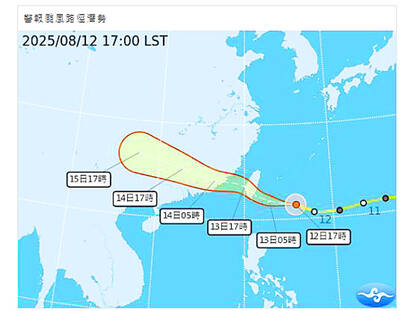Japan’s Nissan Motor Co plans to invest ¥50 billion (US$554 million) to boost battery production for electric vehicles produced by its French partner Renault, a report said yesterday.
Automotive Energy Supply Corp, Nissan’s joint venture with the NEC group, will upgrade its plant for lithium ion batteries in Kanagawa prefecture, southwest of Tokyo, the Nikkei Shimbun daily reported.
Nissan, Japan’s third largest automaker, is to invest up to ¥20 billion in the upgrade aimed to supply 35,000 batteries to Renault, which plans to launch electric vehicles in 2011, the newspaper said.
NEW PLANT
Nissan separately plans to invest some ¥30 billion to jointly build a new plant with Renault in France to supply lithium ion batteries for Renault’s electric cars, it said.
The Franco-Japanese group is expected to begin operation at the new plant by 2012, and aims to supply batteries for around 60,000 cars, Nikkei said.
The two firms will use a low-interest loan facility offered by the French government for green cars, it said, adding that they also plan to share motors and other key components of electric vehicles to cut production costs.
ZERO-EMISSION
Nissan CEO Carlos Ghosn said last month his company aims to make rechargeable batteries for electric cars one of its key businesses, predicting a bright future for zero-emission vehicles.
Nissan, which is falling behind Toyota Motor Corp and other rivals in hybrid vehicles, plans to launch its first electric car, the Leaf, late next year.

DEFENSE: The first set of three NASAMS that were previously purchased is expected to be delivered by the end of this year and deployed near the capital, sources said Taiwan plans to procure 28 more sets of M-142 High Mobility Artillery Rocket Systems (HIMARS), as well as nine additional sets of National Advanced Surface-to-Air Missile Systems (NASAMS), military sources said yesterday. Taiwan had previously purchased 29 HIMARS launchers from the US and received the first 11 last year. Once the planned purchases are completed and delivered, Taiwan would have 57 sets of HIMARS. The army has also increased the number of MGM-140 Army Tactical Missile Systems (ATACMS) purchased from 64 to 84, the sources added. Each HIMARS launch pod can carry six Guided Multiple Launch Rocket Systems, capable of

Tropical Storm Podul strengthened into a typhoon at 8pm yesterday, the Central Weather Administration (CWA) said, with a sea warning to be issued late last night or early this morning. As of 8pm, the typhoon was 1,020km east of Oluanpi (鵝鑾鼻), Taiwan’s southernmost tip, moving west at 23kph. The storm carried maximum sustained winds of 119kph and gusts reaching 155kph, the CWA said. Based on the tropical storm’s trajectory, a land warning could be issued any time from midday today, it added. CWA forecaster Chang Chun-yao (張竣堯) said Podul is a fast-moving storm that is forecast to bring its heaviest rainfall and strongest

TRAJECTORY: The severe tropical storm is predicted to be closest to Taiwan on Wednesday and Thursday, and would influence the nation to varying degrees, a forecaster said The Central Weather Administration (CWA) yesterday said it would likely issue a sea warning for Tropical Storm Podul tomorrow morning and a land warning that evening at the earliest. CWA forecaster Lin Ting-yi (林定宜) said the severe tropical storm is predicted to be closest to Taiwan on Wednesday and Thursday. As of 2pm yesterday, the storm was moving west at 21kph and packing sustained winds of 108kph and gusts of up to 136.8kph, the CWA said. Lin said that the tropical storm was about 1,710km east of Oluanpi (鵝鑾鼻), Taiwan’s southernmost tip, with two possible trajectories over the next one

GET TO SAFETY: Authorities were scrambling to evacuate nearly 700 people in Hualien County to prepare for overflow from a natural dam formed by a previous typhoon Typhoon Podul yesterday intensified and accelerated as it neared Taiwan, with the impact expected to be felt overnight, the Central Weather Administration (CWA) said, while the Directorate-General of Personnel Administration announced that schools and government offices in most areas of southern and eastern Taiwan would be closed today. The affected regions are Tainan, Kaohsiung and Chiayi City, and Yunlin, Chiayi, Pingtung, Hualien and Taitung counties, as well as the outlying Penghu County. As of 10pm last night, the storm was about 370km east-southeast of Taitung County, moving west-northwest at 27kph, CWA data showed. With a radius of 120km, Podul is carrying maximum sustained